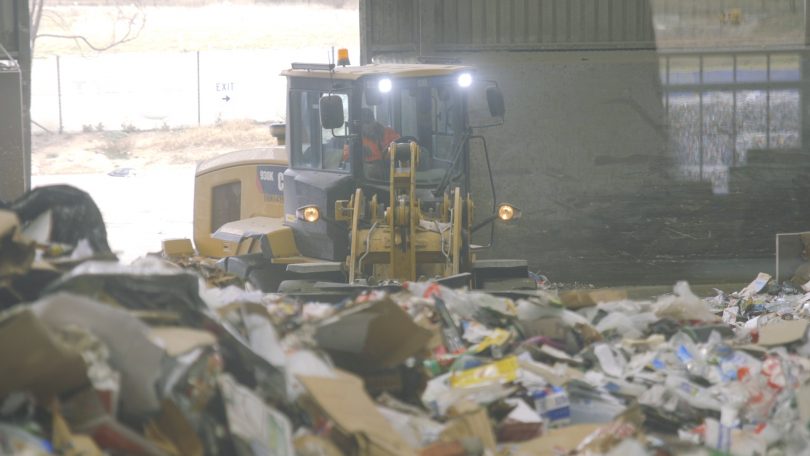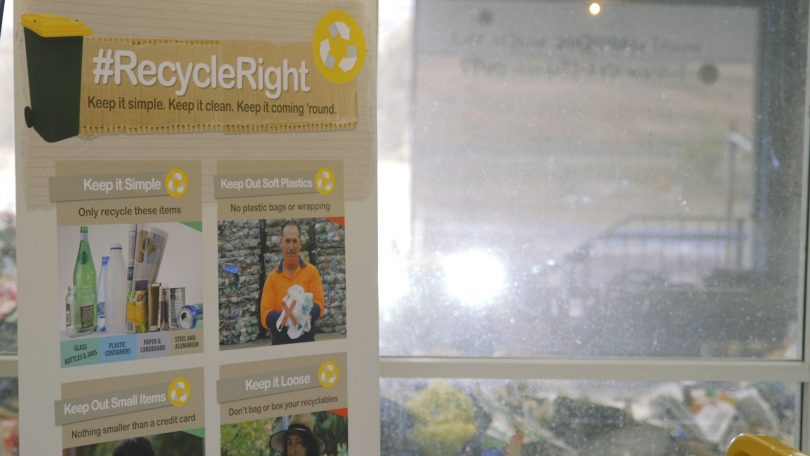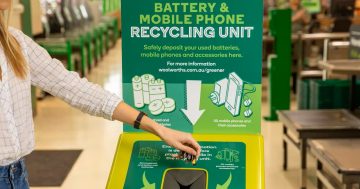
There are plenty of major misunderstandings about what’s really recyclable. Photos: George Tsotsos.
You wouldn’t credit the rubbish that people put into the recycling. On a freezing day at Mugga Lane Recycling Facility as the new Recycle Right campaign is launched, we’re looking at some of the things that have been fished out of the recycling chain in the last ten days alone.
There’s an entire table full of knives, large and small. A child’s toy electric guitar. A very used vacuum cleaner.
More seriously, given the recycling goes into crushing machines after being sorted, there is a pallet full of batteries. It all goes to show that while we diligently believe we’re doing the right thing when we sort the rubbish, there are plenty of major misunderstandings about what’s really recyclable.
The ACT Government and surrounding regions have banded together to launch Recycle Right, a cross border effort that they hope will help to address what Urban Services and Transport Minister Chris Steel called “a national waste crisis”.
There are six steps to the Recycle Right campaign: keep it simple; keep out soft plastics; keep out small items, keep it safe, keep it clean and keep it loose. The campaign is accompanied by television advertisements focusing on the basics.

There are six steps to the Recycle Right campaign.
One of the major problems is soft plastics including bags, cling wrap and chip packets. Even if they have a recycling symbol, they’ll jam up the works. Items smaller than a credit card are also unsuitable for recycling, while recycling that’s contaminated with food scraps, nappies and soiled paper can also disrupt the process, shunting otherwise reusable waste into landfill and posing safety issues for staff.
Speaking at the launch, Canberra Region Joint Organisation chair Rowena Abbey said that an average 43 per cent of kerbside domestic waste generated is already recycled in the region, but the target is to reach 70 per cent by 2022.
It’s a significant matter for regional councils like the Snowy Monaro, where new charges have been introduced for domestic recycling disposal and new green waste disposal at all Council waste facilities. While recycling fees have been in place for many years for commercial disposal, Mayor John Rooney said that Council had seen no alternative to additional fees in order to continue providing the community with access to recycling services.
The Snowy Monaro solution was to enter into a processing and management agreement with the ACT, which also accepts and processes waste from the Queanbeyan-Palerang Regional Council.
All sorts of rubbish goes into the recycling, as Genevieve Jacobs discovered at Mugga Lane today. The ACT Government and regional councils have launched the Recycle Right campaign to change our rubbish habits and clear up recycling confusion.
Posted by The RiotACT on Thursday, July 11, 2019
Many local government recyclers have been hit hard by the China National Sword Policy, launched at the beginning of 2018. The Chinese government now imposes heavy restrictions on the importation of recycled materials, including strict contamination limits for recyclable materials.
The ban has had a bracing effect on existing recycling options, meaning that many local governments have had to rethink where their waste goes. Minister Steel also noted that there are strong economic positives for regions that do recycling well, since the resale and manufacturing profits are retained within Australia.
The recycling process at Mugga Lane is managed by Re.Group. Managing director David Singh pointed out that cutting edge recycling technology can include some unexpected wins: a building site sand shortage in the ACT is being partly remediated by 99 per cent recycled glass.













